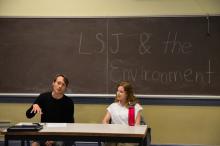By
The Daily reporter
The UW Law, Societies, and Justice (LSJ) department held a panel Wednesday discussing the critical aspects of climate change and ways people can minimize such effects.
Although individual actions are encouraged to combat the impacts of climate change, they are not always the most effective.
Trace Chaplin, a doctoral student in the Jackson School of International Studies, and Brandon Derman, an LSJ lecturer encouraged students to think on a bigger scale.
“We can change the lightbulbs in our homes, or not drive as much,” Derman said. “However, these are merely privileges. We need to engage in significant actions.”
Many residence halls at the UW encourage students to take shorter showers and turn off the lights when they leave their dorm room. These simple actions might help, but they do not take a huge step forward.
“It’s not all about taking a shorter shower,” Chaplin said. “We need to look at big industries who use a lot of water.”
Some UW students, like Kelly James Anguiano, felt more responsibility to get involved after attending Wednesday’s discussion.
“I believe that climate change is a real threat that is affecting us more than we choose to believe, and we should mind ourselves and the actions we do that affect the world we are living in,” Anguiano said.
Being an active member in a collective body can be more important and helpful for alleviating the effects of climate change today.
“It’s important to get yourself feeling like an agent, and feeling good so you can engage in significant actions,” Derman said.
Consumerism is one of the primary causes of climate change. People often don’t realize it takes an immense amount of water to make the food we consume every day: A loaf of bread requires about 240 gallons of water, and a pound of corn, 147 gallons, to produce.
“Production of food is a huge water cost,” Chaplin said. “Easiest thing is just to buy less. There’s always going to be a tradeoff.”
According to Chaplin, it’s our job as individuals to think about the bigger picture and figure out how to change the rules. One way to do so is by voting to approve the Washington state carbon-tax initiative, which will be on ballots this year.
The proposal emphasizes the goal to decrease the state’s sales tax by 0.5 percent in the first two years and institute a carbon tax that will increase to $15 per ton in the first year, then will go up to $25 per ton in the second year. With this initiative, corporations that are polluting the air are expected to use better equipment to reduce carbon monoxide output.
“We are already committed to a world with a climate impact,” Chaplin said. “Climate change needs to be about people and their livelihood.”
This story originally appeared on May 12th, 2016 in The Daily: http://bit.ly/1TSF7z8
